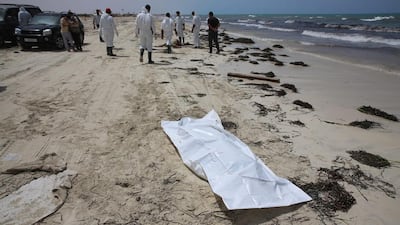ATHENS // More than 110 bodies of migrants were pulled from the sea off Libya on Friday, while nine others drowned and 340 were rescued after a boat carrying illegal migrants sank south of Crete.
The Libyan Red Crescent said at least 117 bodies – 75 women, six children and 36 men – were recovered near the western city of Zwara and the death toll was expected to rise.
All but a few were from African countries, said spokesman Mohammed Al Mosrati.
Authorities are still not certain when or how the people died. Col Ayoub Gassim of the Libyan navy said coast guards found an empty boat drifting on Thursday, adding it was possible the vessel had capsized a day earlier.
Mr Al Mosrati said the bodies were not “decomposed and therefore have drowned within the past 48 hours”. He said the boat that was found might have been the one carrying the victims. But strong winds and currents can push bodies from one place to the other, he said, making it difficult for authorities to determine where the tragedy occurred.
Meanhile, Greek authorities said a roughly 25-metre vessel resembling a large fishing boat was spotted half-sunk about 75 nautical miles south of Crete in international waters, triggering a massive search-and-rescue operation involving helicopters, aircraft, patrol boats and passing merchant ships.
Most of the survivors were picked up by the Norwegian-flagged Clipper Hebe tanker and were being taken to the Sicilian port of Augusta in Italy. Others were to be taken to Egypt and Malta. The Greek coast guard said the operation was continuing to search for any missing passengers.
“The information we have on the number of people on board the vessel is still unclear – we’ve heard that there were 400 or 500 people on board, but we cannot confirm that number,” said spokesman Nikos Lagadianos said. “There is a huge rescue effort under way.”
The sinking is the latest known disaster to strike for refugees and migrants hoping to find better lives in Europe, and comes after more than 1,000 people drowned since May 25 while attempting the perilous journey across the sea from North Africa to Europe’s southern shores.
As traffickers take advantage of the improving weather, officials say it is impossible to know how many unseaworthy boats are being launching daily from Libya to Europe – and how many never reach their target. A host of naval operations in the southern Mediterranean, coordinated by Italy, have been stretched just responding to the disasters they do hear about.
Aid officials say the last two weeks have been especially deadly because smugglers are using riskier tactics, bigger boats and even less-seaworthy vessels than ever before.
Frederico Soda, who heads International Organisation for Migration’s Mediterranean office in Rome, said the increase in those making the deadly crossing was due “in part, to better weather, and in part to the use of bigger wooden boats that can carry more people than the rubber boats” used last year.
William Spindler, a spokesman for the UN refugee agency, noted new and far riskier tactics being used by traffickers. He said until last week he had never heard of smugglers using an overloaded boat carrying hundreds of people to tow another vessel packed with hundreds more that lacked an engine. In the incident on May 26, the second boat capsized, drowning what his agency estimated was around 550 migrants.
* Associated Press

